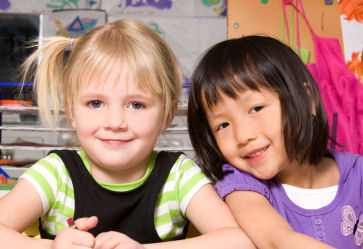Up to the age of nine or ten, a child's brain continues to be twice as active as an adult's. Around the age of nine, peer relationships seem to predominate. It's at this point that we start to see the brain gearing up for adolescence. Many of the neurological changes that occur in the brain during the teenage years commence well before a child gets to high school - a fact that any primary-school teacher will confirm with a sad nod of the head.
 |
| Children Development In Late Primary School |
While the early onset of puberty is often viewed with dismay by adults, it may actually benefit some young people. Early maturers score slightly higher on IQ tests than their later-maturing counterparts, and this small advantage appears to persist into adulthood.
During these years, the brain starts to slow down. An eight or nine-year-old's brain runs at about twice the speed that yours does; between eight and 18, it slows down to its adult running rate.
Following this is a stage in which the world is simplified into two basic states: "boy germs" and "girl germs." Where I grew up, all the guys would hang out on the playground, play football, or play marbles, while the girls did something strange with elastic that involved chanting.
The division of the sexes is very clear at this stage, and just when you think you've got it all sorted out - when you've got all the guys on the field or all the girls out with the elastic, and never the twain shall meet; when you've got the sign that says "No Boys [or Girls] Allowed" - then puberty comes along to change everything. Here's a few suggestions:
- Build goodwill in families.
- Discourage and divert from aggressive acts.
- Couple high expectations with high faith in the child.
- Limit the carbohydrate intake.
- Broaden friendship groups.
- Try to get bright children into the habit of cooperating with family and mixing with a range of people.
- Stop them settling into a repetitive pattern of angry and aggressive behavior by defusing potential battlegrounds early on or dealing with confrontations quickly.
Families can feel like international courts of appeal if they have Debater children. Try to keep things fair and routine.
Late childhood and early adolescence is a time of grief and loss - the child is alone in a way that she never was during childhood. Part of the loneliness of this time is due to her sense of belonging getting seriously confused. It gets confused because a new identity is breaking through the shell of childhood.
Part of this new up-surge is to do with identity formation - who she is as a person. Both boys and girls feel pressured to grow up faster than they can, and this pressure becomes focused on what they want to do with their
lives - the task of realizing their dreams. This acceleration of life leaves many victims in its wake: for too many young people, life becomes a problem to be solved rather than a mystery to be unraveled. The role of parents is to protect their child's childhood, to ensure they are not exposed to the pressures, lures, and experiences of adulthood too early. To find out more, you can check out Children Development In Late Primary School.


